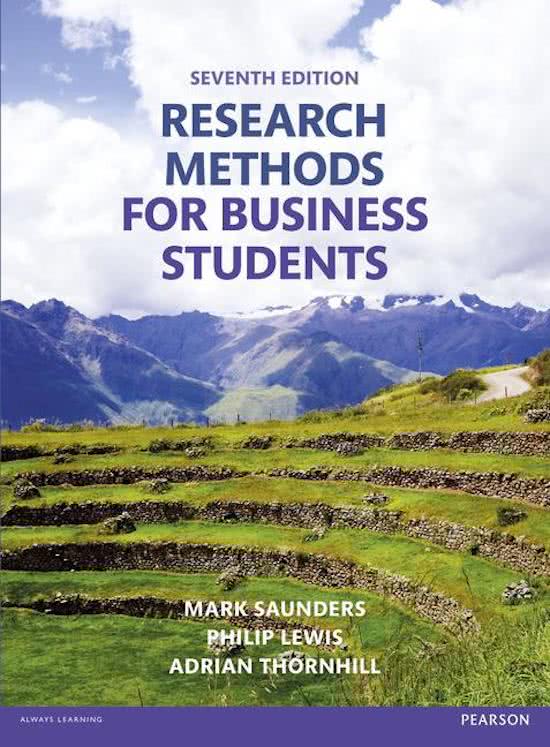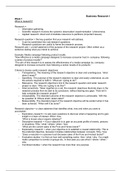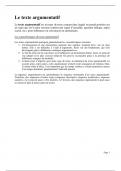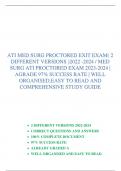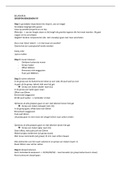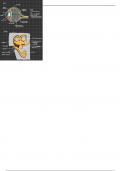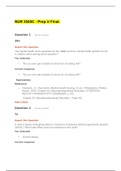Week 1
What is research?
Research =
- Information gathering.
- Scientific research involves the systemic observation/ experimentation / phenomena.
- Applied research: direct and immediate relevance to partitions (important issues).
Research question = the key question that your research will address.
- It can be subdivided into sub-research questions.
- Research questions are useful to frame the research process.
Research aim = a brief statement of the purpose of the research project. Often written as a
sentence stating what you intend to achieve.
Example: Media campaign following product recalls.
“How effective is a media campaign designed to increase consumer trust in -company- following
a series of product recalls?”
“The aim of this research is to assess the effectiveness of a media campaign by -company-
designed to increase consumer trust following a series recalls of its products.”
Criteria to devise useful research objectives:
- Transparency. The meaning of the research objective is clear and unambiguous. “what
does it mean?”
- Specificity. The purpose of the research objective is clear and easily understood, as are
the actions required to fulfill it. “What am I going to do?”
- Relevance. The research objective’s link to the research question and wider research
project is clear. “Why am I going to do this?”
- Interconnectivity. Taken together as a set, the research objectives illustrate steps in the
research process from its start to its conclusion, without leaving any gaps. “How will it
help complete the research project?”
- Answerability. The intended outcome of the research objective is achievable. “Will this
be possible” & “Where shall I obtain data?”
- Measurability. The intended project of the research objective will be evident when it has
been achieved. “When will it be done?”
Research objective = a clear statement that identifies what, how and when you want to
accomplish.
- Exploratory research = to ask open questions to discover what is happening and to gain
insight in a topic of interest. What / how.
“What is known about organic labeling?”
- Descriptive research = if your objective is to gain an accurate profile of events, persons
or situations. Who / what / where / when / how.
“What are the current sales of the Pure and Hones brand?”
- Explanatory research = when your objective is to establish a causal relationship. This is
the preferred objective, because it implies relationships between concepts. Why / how.
“Does a reduction in customer trust decrease sales of the Pure and Honest brand?”
- Evaluative studies = to find out how well something works. How / what / why. You might
make comparison to events or groups etc. In that case you use which / where / when /
who.
- Combined studies = when the research has more than one purpose.
, ResearchQuestion/ ResearchObjective:
Exploratory / WhatamI tryingtofindout?
Descriptive Research
Exploration:
WhatdoI (or others)already
know?
Conceptual Model GapinKnowledge=
needsdata
A
C D
B
Descriptive/
Explanatory Research ResearchDesign:
Howwill I findoutwhatI needto
know?
Analysis
Findings&Conclusions
Research approach = the perspective you take for your research: inductive,
deductive, or abductive.
Research strategy = a general plan of how you will go about answering your
research questions.
Research design = the framework you will use for your data collection and analysis
that will allow you to answer your research question.
Research approaches: see pp. 145 & 146 for detailed steps.
- Inductive research = approach that involves developing theory after observation of a
collection of data, often in the form of a conceptual model. Collect data, then create
theory. Your research will be data driven.
- Deductive research = when your research starts with theory, and you design a research
strategy to test the best theory. Know theory, then collect data to test best theory.
Theory driven.
Theory = explanation or story based on systematic evidence.
Whetten identified that theory is composed of four elements.
1. What are the variables or concepts that the theory examines?
2. How are these variables or concepts related?
3. Why are these variables or concepts related? This is used with logical reasoning.
4. Who does this theory apply to; where does this theory apply; when does this theory
apply?
Theory is not: references, data, list of variables, diagrams, hypotheses of predictions. This helps
explain and form a theory but are not theories on their own.
Research proposal = a structured plan of your proposed research objective. The following
groundwork needs to be done prior to writing your research proposal.
- Define the research objective
- Review of academic and business literature
- Identify your research approach
- Design your research/ methodology
- Assess ethical issues with regards to your data collection
- Define target population and sampling techniques
- Define data collection methods and data analysis techniques.

